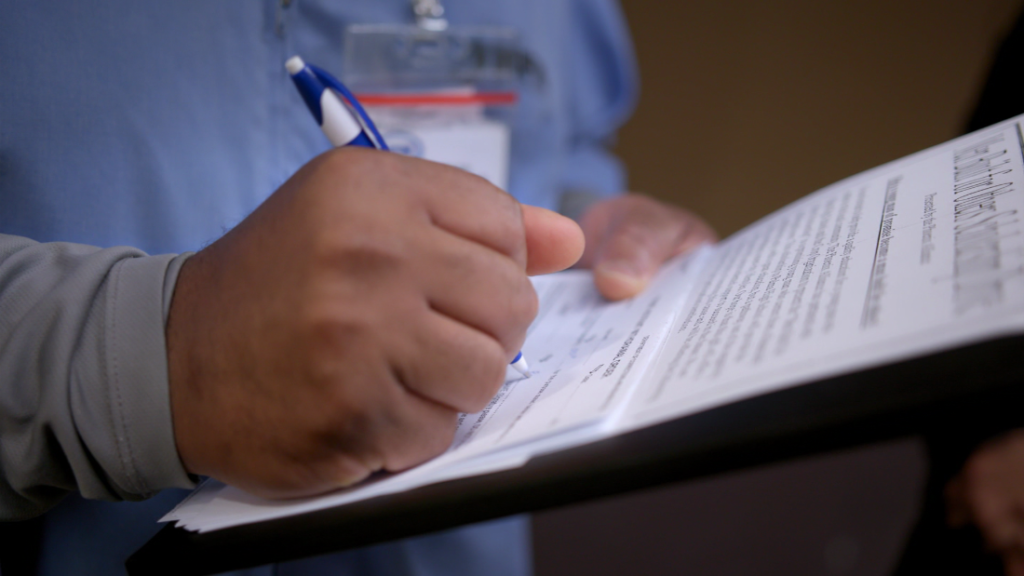Palma School, a prep school for boys in Salinas, California, created a partnership with the Correctional Training Facility (CTF) at Soledad State Prison to form a reading group for inmates and high school students — bringing the two groups together to learn and develop greater understanding of one another.
But the reading group has developed into much more than an exchange of knowledge and empathy. When one Palma student was struggling to pay the $1,200 monthly tuition after both his parents suffered medical emergencies, the inmates already had a plan to help.
The inmates, who the program calls “brothers in blue,” raised more than $30,000 from inside the prison to create a scholarship for student Sy Green — helping him graduate this year and attend college at The Academy of Art University in San Francisco.
“Regardless of the poor choices that people make, most people want to take part in something good,” said Jason Bryant, a former inmate who was instrumental in launching the scholarship. “Guys were eager to do it.”
Inmates eager to pay it forward with education
Bryant served 20 years for armed robberies in which one victim was fatally shot by an accomplice. But while inside Soledad State Prison, he made a daily effort to turn his life around, earning his bachelor’s degree and two masters and running leadership training programs for inmates.
“I’m never far from the reality that I committed a crime in 1999 that devastated a family — several families — and irreparably harmed my community,” Bryant said. “I keep that close to my heart, and I would hope that people can identify the power of forgiveness and the probability of restoration when people put belief in each other.”
In a twist of fate inside the prison, Bryant had reconnected with his former crime partner, Ted Gray, who had the idea to start the scholarship and pay it forward with the gift of education. Hundreds of incarcerated men jumped at the opportunity to make a heavy, meaningful investment in someone else’s life.
Considering that minimum wage in prison can be as low as 8 cents an hour, raising $30,000 is an astonishing feat. It can take a full day of hard labor to make a dollar inside prison, so every cent donated by inmates is worth a lot more than a penny in the free world. Some brothers in blue who had no money to donate even hustled to sell possessions or food so they could be a part of the campaign.
The perfect scholarship candidate
The brothers in blue did not get to choose who got their scholarship, but in hindsight they said Sy Green was the perfect candidate.
Sy’s parents wanted him to have a top notch education and transition away from a public school that had problems with gangs, drugs and fighting. But after his first six months at Palma School, their money started depleting fast, even with financial aid. When his father, Frank Green, needed heart surgery and became unable to work, the family was on the brink of being unable to pay tuition.
That’s when they found out they would be receiving a massive gift from complete strangers inside the correctional facility.
“It brought me to tears,” Frank Green said. “At that particular time, it was a truly a blessing. It was unheard of.”
Sy and his family started making visits to the prison in addition to taking part in the Palma reading group. He and his family have embraced building relationships with many of the bothers in blue, and four former inmates even attended his high school graduation.
He told CNN that knowing hundreds of men made sacrifices for his education inspires him to try his best and work hard every day. Sy plans to continue visiting the prison on his breaks from college, where he now plays basketball and studies sports broadcasting.
“That’s only the right thing to do. Beyond the scholarship, the knowledge that they pour into you, that’s, that’s the best thing,” Sy said. “They definitely take my future serious and they genuinely do care about me as a person.”
Meanwhile, being involved with the scholarship gave many inmates an opportunity they never had — the chance to be a role model.
Bryant added that the Green family was a perfect fit for the scholarship because they put trust in the inmates’ leadership.
“They would bring him into the prison to receive mentorship, to participate in groups with us, to share his goals and visions, and to really have accountability conversations with men in blue — men who had made terrible choices,” Bryant said. “They put in an incredible amount of not only gratitude and appreciation, but also trust in us to help mentor their son. And that was remarkable.”
Rehabilitation and restorative justice
“(It’s) what needs to happen. Our job is to help these men reintegrate back into society,” Koenig said. “As these men are leaving, a far larger percentage of them are becoming productive members of society than what we had before. So, why wouldn’t we do it? We’re trying to transform men’s lives.”
A belief in altering lives through the powers of compassion and honest discussion is still what drives Palma School’s reading program today.
“I don’t feel like myself or my team or the guys who contributed to this incredible gift for Sy are special. We’re just people who want to do good things,” said Bryant. “If more people just decided to do good things, this world would be a better palace.”
You may also like
-
Afghanistan: Civilian casualties hit record high amid US withdrawal, UN says
-
How Taiwan is trying to defend against a cyber ‘World War III’
-
Pandemic travel news this week: Quarantine escapes and airplane disguises
-
Why would anyone trust Brexit Britain again?
-
Black fungus: A second crisis is killing survivors of India’s worst Covid wave

